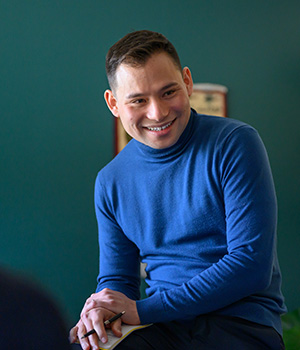
Erik Lin-Greenberg
(he/him)
Political Science
Empathy and enduring support
“He has encouraged me when I’ve been struggling; he’s cajoled me when I’ve needed motivation,” praised one of Erik Lin-Greenberg’s nominators. “He’s guided me through the paper publication process and lifted me up as a coauthor.”
Lin-Greenberg is the Leo Marx Career Development Assistant Professor in the Department of Political Science. His research examines how emerging military technology affects conflict dynamics and the use of force. His other academic interests include the international politics of food and the use of wargaming as a tool of scholarly inquiry.
Thoughtful and personalized supervision
Thoughtful supervision of students underlies Lin-Greenberg’s commitment to cultivating the next generation of researchers. Students describe his knack for identifying weak arguments, as well as his guidance through challenging publication processes. In particular, his role as a committee member stands out to one of his nominators: “For my dissertation, Erik has mastered the difficult art of giving feedback in a way that does not discourage.”
Lin-Greenberg’s personalized approach is further evidence of his exceptional teaching. In the classroom, students praise his thorough preparation, ability to facilitate rich discussions, and flexibility during high-pressure periods. In addition, his unique ability to break down complex material makes topics accessible to the diverse array of backgrounds in the classroom.
He is also actively involved in wider-reaching initiatives such as the Wargaming Working Group in the MIT Center for International Studies, where he leverages his professional connections to foster community with other practitioners. During the pandemic, he encouraged students to write about their experiences with remote wargaming, resulting in a student’s first publication.
Empathy and enduring support
Lin-Greenberg’s mentorship extends far beyond academics, encompassing a genuine concern for the well-being of his students through providing personal check-ins and unwavering support.
Much of this empathy comes from Erik’s own tumultuous beginnings in graduate school, where he struggled to keep up with coursework and seriously considered leaving the program. The care and dedication that mentors displayed towards him during that time made all the difference. He points to one advisor in particular, Tonya Putnam, as having an enormous impact.
“She consistently reassured me that I was doing interesting work, gave amazing feedback on my research, and was always open and transparent,” he recounts. “When I’m advising today, I constantly try to live up to Tonya’s example.”
In his own group, Erik chooses creative approaches to mentorship, including taking mentees out for refreshments to navigate difficult discussions related to their dissertations. In his students’ moments of despair, he boosts their mood with photos of his cat (Major General Lansdale).
Ultimately, one nominator credited his ability to continue his PhD to Lin-Greenberg’s uplifting spirit and endless encouragement: “I cannot imagine anyone more deserving of recognition than Erik Lin-Greenberg.”
